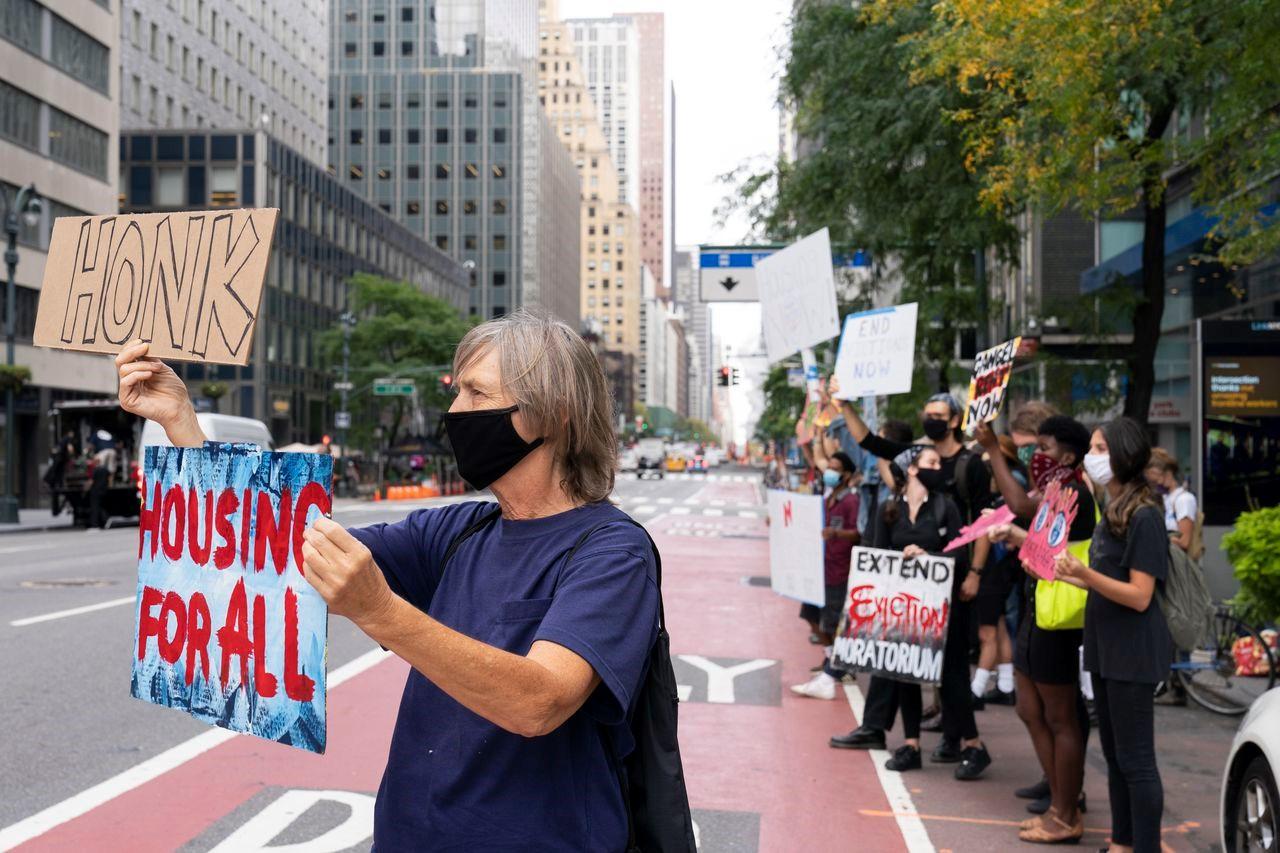
7 minute read
Gender Rights at Oneida Jail
LSCNY Fights for Gender Equality in Oneida County Jail
By Sam Young, Director of Advocacy
Advertisement
While working from home during the COVID-19 pandemic, LSCNY Staff Attorney Josh Cotter read a story in the Utica Observer-Dispatch which caught his eye. While Cotter and all other LSCNY employees were confined to work at home because of the COVID-19 virus, women inmates at the Oneida County Jail were confined under very different conditions. Josh learned that women at the
Oneida County Jail, who had until recently been housed in open, modern pods, had all been transferred to older, more confining linear housing units. He traveled to the facility in Oriskany, New York, where he spoke with many of the women, and confirmed that they were being housed under much harsher conditions than their male counterparts. “My first reaction was that our office has to do something to help them,” said Cotter. “The women described their living conditions as a 'dungeon' or a 'dog
kennel'. Nobody should have to live in the conditions they described to me.” The cells in these linear housing units are smaller, darker, and offer the women they house less privacy, and fewer privileges and opportunities than the pods which house the male inmates. The cells in the pods, where women were housed until January of 2020 (and where general custody men are currently housed), have 80 square feet of space, and contain a bed, a desk and chair, a mirror, a toilet and sink, a window which lets in natural light from the outside, and a solid door with a narrow window, which afforded the women some semblance of privacy. The podular units contain 56 cells surrounding a large, open day room with tables and chairs, where the inmates can congregate to read, talk, or play games. They also offer a recreation room with fresh air and exercise equipment, where inmates may exercise for up to six hours each day, a small library room which contains books, magazines and games, and a room which could be used for private video visits with family members. The pods also offer two cable televisions, air conditioning, showers, telephones, microwave ovens, and water coolers. The linear housing units, which are in an older part of the jail, feature a line of cells which are only 35 square feet in area—less than half the size of the cells on the pods. The cells contain only a bed, toilet and sink. One of Cotter’s clients described the cells as so small that she could lie on the bed, and touch both walls with her extended arms. Instead of a solid door, the cells have metal bars, so that anyone can see into the cells at any time. They have no
natural light. The linear unit lacks space for the inmates
A linear housing unit at Oneida County Jail
to congregate. There is a narrow catwalk between the two rows of cells, which is no more than six feet wide, and contains a few tables. There is a single telephone and shower stall, which must be shared by all of the women in the facility. The women on the unit may have a maximum of two hours of recreation each day, in an outside yard with no exercise equipment. There is no air conditioning, microwave, or water cooler. According to jail officials, the older linear units are mostly
used for inmates who are being disciplined, who have mental health issues, or who require isolation. The newer
pods are used for general custody inmates, and the privileges they receive from being on the pods encourages good behavior. On the morning of January 22, 2020, all of the women in the jail were being housed in one of the pods. That morning they were ordered to gather their belongings and move to one of the linear housing units. When they arrived, they found the unit dirty and smelly. There was toilet paper and feces stuck to the bars. The women were ordered to clean the cells. Several of the women stated that this made them ill. The women immediately began submitting written complaints to the corrections officers about the inferior conditions. According to the women, most of their complaints were either ignored or never addressed. conditioning, movable fans were placed at either end of the unit. Recreation time was increased from one hour a day to two hours. In response to the lack of a microwave and water coolers, the jail began delivering cold and lukewarm water several times a day. There was no television for the women to watch when they arrived in the linear unit, but after complaining, they were brought a single television with no reception, which they could use to watch DVDs. Despite repeated complaints, however, the County Jail refused to consider returning the women inmates to the
pods, claiming that the lower inmate population for females made housing them in the pods too costly and impractical. One of LSCNY’s clients, Sarah Barrett, had this to

Some of the women’s complaints yielded modest changes. fun, but being treated differently just because I am a For instance, in response to their complaints of lack of air woman makes it almost unbearable.”
say about the unequal conditions to which the women
A typical “pod” style housing unit at the jail.
were being subjected: “I know jail is not supposed to be On May 12, 2020, LSCNY filed a federal class action lawsuit against Sheriff Robert Maciol and Chief Deputy Lisa Zurek, asserting that housing general custody women in the linear units, and general custody men in the pods, constitutes a denial of equal protection to the female inmates. The case is pending before U.S. District Court Judge Mae D’Agostino. One month after filing the complaint, LSCNY asked the District Court Judge to certify all of the female general-custody inmates as a class of plaintiffs. At the same time, LSCNY asked the court for a preliminary injunction, ordering the jail to provide the class of women with equal housing conditions and privileges as those enjoyed by their male counterparts. In a lengthy decision issued on August 3rd, Judge D’Agostino granted class certification to the plaintiffs, but denied their motion for preliminary injunction. While stating that she was troubled by certain aspects of the disparity in the conditions between males and females, including the lack of air conditioning for the women inmates, Judge D’Agosti-
no stated that at this point, the plaintiffs “have not met the high threshold to demonstrate that general custody women do not receive substantially equivalent treatment to men in general custody.” Expressing her hesitation to stage, Judge D’Agostino concluded: “The decision of a federal court to interfere in the daily operations of a local jail should not be made lightly. At this stage, the Court is unwilling to undertake this disfavored activity.” LSCNY immediately appealed Judge D’Agostino’s decision to the Second Circuit Court of Appeals, and requested that the appeal be handled on an expedited basis. The Court granted this request. Within just three months, the record on appeal and briefs were filed with the Second Circuit, which held oral argument on this case on November 20th . Appearing over the telephone before a panel of appellate judges in New York City, Josh Cotter explained to the appeals court why the women at the jail were receiving unequal treatment from the male inmates, and why Judge D’Agostino was incorrect in denying them a preliminary injunction. “General custody women held at the Oneida County Jail are housed in small, dank housing units, and given only a fraction of the privileges and benefits afforded to their similarly situated male counterparts, simply because they are women. . . . Perhaps the most telling error in the District Court’s decision was [its] failure to really appreciate or even analyze the stark differences in housing conditions that women are placed under in the Oneida County Jail.” when he pressed the County’s attorney at oral argument about the disparity in conditions: “Size, windows, the ability to congregate, and the ability to go outside. These are things that are markedly different in the linear as opposed to the pod units. . . . They seem to be pretty significant differences.” The County’s representative appeared at a loss to disagree. In addition to Judge Sullivan, who is an appointee of President Trump, the panel consisted of Chief Judge Debra Ann Livingston, an appointee of President George W. Bush, and Judge Amalya Kearse, an appointee

second-guess the corrections officials at the preliminary
of President Carter. The Second Circuit took the appeal under advisement, and will be issuing a decision in the weeks or months ahead. According to Josh Cotter, “it was important to bring this lawsuit to ensure women receive the same housing conditions and privileges as their male counterparts,
and to continue our work holding local jails accountable for their unconstitutional policies and practices.” In addition to Josh Cotter, Sara Adams, Sam Young and volunteer attorney Maurie Heins have been working on this case.







